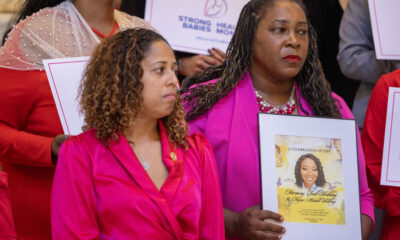Mississippi Today
Trump order threatens funding for Miss. colleges, cultural centers
For nearly three decades, a little-known federal agency has provided millions of dollars in support and funding to Mississippi’s colleges and universities museums, to libraries and to cultural institutions, including the Margaret Walker and COFO Civil Rights Center at Jackson State University.
In 2011, the state’s largest historically Black university’s cultural center and museum, received a $48,000 grant from the Institute of Museum and Libraries Services. The grant paid for staff to travel and learn about the historical preservation work from larger museums and institutions across the country.
“That grant was my professional development,” Robert Luckett, director of the cultural center said. “It was so important and has been foundational for all of the work we’ve done at Jackson State for the last fifteen, sixteen years.”
But, Jackson State isn’t the only Mississippi college that has benefitted from funds from IMLS, and the federal agency has flowed millions of dollars in grants to the state.
In 2022, Mississippi State University received a $74,000 grant to fund its Office of Museum Services and a $50,000 grant from the American Rescue Plan for Museums and Libraries to train and hire students from underserved communities to assist with biological collection and conservation. That same year, Northwest Mississippi Community College received $33,000 from the agency to support a series of community engagement discussions for students around racial injustice, mental health and stress in the post COVID-19 pandemic.
In 2020, Hinds Community College Utica’s campus received a $101,000 grant from IMLS’s Museums Grants for African American History and Culture to establish an oral history project for Black rural Mississippians and provided technology and equipment to record stories for residents who couldn’t make it to the campus museum. The federal agency also awarded $500,000 to the University of Mississippi through its Save America’s Treasures program and in 2010 a $450,000 grant to its Modern Political Archives to preserve and digitize 3,800 audio and visual recordings.
The Margaret Walker Center, which houses oral histories, manuscripts, book collections and history archives of Black Mississippians, and operates as the Black Studies Institute for Jackson State University, has been a cornerstone of cultural development for students.
Now, with an executive order from President Donald Trump, which led the federal agency’s nearly 70 employees to be placed on administrative leave last week, the future of the Margaret Walker Center’s work remains unclear.
The move to shut down IMLS comes weeks after President Donald Trump signed an executive order to scale down six other federal agencies to “the minimum presence,” according to The Washington Post.
The agency’s funding, which is less than one percent of the federal budget, has dolled out millions of dollars to museums, libraries and institutions. But, in states like Mississippi, where access to traditional resources and support for cultural institutions may be near to none or nonexistent, the agency’s funding has been essential in providing tools to do important work, Luckett said.
Out of the eight full-time staff members at the cultural center, two staff and a graduate fellow who works to digitize the historical archives is funded by subgrants of IMLS through the Smithsonian Institute, another national cultural institution facing cuts by the Trump administration. These jobs on the digital humanities staff could be in jeopardy.
Earlier this year, Luckett said his team applied for another grant from IMLS to pay for their renovation project of Ayer Hall, the oldest building on Jackson State University’s campus and home to the Margaret Walker Center. The grant funding will provide support for staff to move its collections into a safe environment.
Luckett said the cultural center was supposed to be notified in June if they receive the grant. But, with the changes to the agency, he’s unsure of what comes next.
“We don’t have the funding to do this,” Luckett said. “We’ll be back to square one.”
Other cultural institutions and organizations across the state such as the Mississippi Humanities Council, which currently has 35 open subgrants to various state colleges and universities, were reeling after hearing a major defunding announcement.
In a late night email, the organization learned their grant through the National Endowment of Humanities had been terminated. The national organization has provided more than 400 grants in Mississippi, including colleges in the state.
Sweeping cuts at IMLS and the National Endowment of Humanities threaten the future of established museum and library programs at local colleges from panels, literary festivals, history tours, youth education workshops and other public programs.
“In [Mississippi] our greatest strength is our history and culture,” Stuart Rockoff, executive director of the Mississippi Humanities Council, said. “Our grants and our programs have helped highlight that especially in smaller towns and rural areas of our state.”
The state’s cultural organization doled out various grants to Mississippi’s public universities and colleges, including a $8,400 grant to the Margaret Walker Center last year, which held a panel discussion on local activism in reflection to Mississippi’s civil rights movement history.
Luckett said protecting the state’s historical collections and providing access to them are key components for the curriculum for students at Jackson State University to engage in scholarship and research.
“These skills are not politicized,” Luckett said. “These are important learning tools for any student of any discipline.”
While it’s easy to ignore the federal agency being closed, the outside impact that such a small agency has on the country is remarkable, Luckett added.
“These are public servants doing these jobs, who are committed and who aren’t willing to get rich,” Luckett said. “This assault on IMLS is something we should all be worried about.”
This article first appeared on Mississippi Today and is republished here under a Creative Commons Attribution-NoDerivatives 4.0 International License.![]()
The post Trump order threatens funding for Miss. colleges, cultural centers appeared first on mississippitoday.org
Mississippi Today
Mississippians highlight Black Maternal Health Week
Advocates and health care leaders joined lawmakers Monday morning at the Capitol to recognize Black Maternal Health Week, which started Friday.
The group was highlighting the racial disparities that persist in the delivery room, with Black women three times more likely to die of a pregnancy-related cause than white women.
“The bond between a mother and her baby is worth protecting,” said Cassandra Welchlin, executive director of the Mississippi Black Women’s Roundtable.
Rep. Timaka James-Jones, D-Belzoni, spoke about her niece Harmony, who suffered from preeclampsia and died on the side of the road in 2021 along with her unborn baby, three miles from the closest hospital in Yazoo City.
“It’s utterly important that stories are shared – but realize these are not just stories. This is real life,” she said.
The tragedy inspired James-Jones to become a lawmaker. She says she is working on gaining support to appropriate the funds needed to build a standalone emergency room in Belzoni.
But it isn’t just emergency medical care that’s lacking for some mothers. Mental health conditions are a leading cause of pregnancy-related deaths, defined as deaths up to one year postpartum from associated causes.
And more than 80% of pregnancy-related deaths are deemed preventable – making the issue ripe for policy change, advocates said.
“About 20 years ago, I was almost a statistic,” said Lauren Jones, a mother who founded Mom.Me, a nonprofit seeking to normalize the struggles of motherhood through community support. “I contemplated taking my life, I severely suffered from postpartum depression … None of my physicians told me that the head is connected to the body while pregnant.”
With studies showing “mounting disparities” in women’s health across the United States – and Mississippi scoring among the worst overall – more action is needed to halt and reverse the inequities, those at the press conference said.
The Mississippi Legislature passed four bills related to maternal health between 2018 and 2023, according to a study by researchers at the University of Mississippi Medical Center.
“How many times are we going to have to come before committees like this to share the statistics before the statistics become a solution?” Jones asked.
A bill that would require health care providers to offer postpartum depression screenings to mothers is pending approval from the governor.
Rep. Zakiya Summers, D-Jackson, the organizer of the press conference, commended the Legislature for passing presumptive eligibility for pregnant women this year. The policy will allow women to receive health care covered by Medicaid as soon as they find out they are pregnant – even if their Medicaid application is still pending. It was spearheaded by Rep. Missy McGee, R-Hattiesburg.
Summers also thanked Rep. Kevin Felsher, R-Biloxi, for pushing paid parental leave for state employees through the finish line this year.
Speakers emphasized the importance of focusing Black Maternal Health Week not just on mitigating deaths but on celebrating one of life’s most vulnerable and meaningful events.
“Black Maternal Health Week is a celebration of life, since Black women don’t often get those opportunities to celebrate,” said Nakeitra Burse, executive director of Six Dimensions, a minority women-owned public health research agency. “We go into our labor and delivery and pregnancy with fear – of the unknown, fear of how we’ll be taken care of, and just overall uncertainty about the outcomes.”
This article first appeared on Mississippi Today and is republished here under a Creative Commons Attribution-NoDerivatives 4.0 International License.![]()
Mississippi Today
Trump to appoint two Northern District MS judges after Aycock takes senior status
President Donald Trump can now appoint two new judges to the federal bench in the Northern District of Mississippi.
U.S. District Judge Sharion Aycock announced recently that she was taking senior status effective April 15. This means she will still hear cases as a judge but will have a reduced caseload.
“I have been so fortunate during my entire legal career,” Aycock said in a statement. “As one of only a few women graduating in my law school class, I had the chance to break ground for the female practitioner.”
A native of Itawamba County, Aycock graduated from Tremont High School and Mississippi State University. She received her law degree from Mississippi College, where she graduated second in her class.
Throughout her legal career, she blazed many trails for women practicing law and female jurists. She began her career as a judge when she was elected as a Mississippi Circuit Court judge in northeast Mississippi in 2002, the first woman ever elected to that judicial district.
She held that position until President George W. Bush in 2007 appointed her to the federal bench. After the U.S. Senate unanimously confirmed her, she became the first woman confirmed to the federal judiciary in Mississippi.
This makes Aycock the second judge to take senior status in four years. U.S. District Judge Michael Mills announced in 2021 that he was taking senior status, but the U.S. Senate still has not confirmed someone to replace him.
President Joe Biden appointed state prosecutor Scott Colom to fill Mills’ vacancy in 2023. U.S. Sen. Roger Wicker approved Colom’s appointment, but U.S. Sen. Cindy Hyde-Smith blocked his confirmation through a practice known as “blue slips,” where senators can block the confirmation of judicial appointees in their home state.
This means President Trump will now have the opportunity to appoint two federal judges to lifetime appointments to the Northern District. U.S. District Judge Debra Brown will soon be the only active federal judge serving in the district. Aycock, Mills, and U.S. District Judge Glen Davidson will all be senior-status judges.
Federal district judges provide crucial work to the federal courts through presiding over major criminal and civil trials and applying rulings from the U.S. Supreme Court and the U.S. Court of Appeals in the local districts.
This article first appeared on Mississippi Today and is republished here under a Creative Commons Attribution-NoDerivatives 4.0 International License.![]()
Mississippi Today
Podcast: Former Rep. Cecil Brown talks current state budget disagreement, compares to past standoffs
The post Podcast: Former Rep. Cecil Brown talks current state budget disagreement, compares to past standoffs appeared first on mississippitoday.org
-

 News from the South - Louisiana News Feed7 days ago
News from the South - Louisiana News Feed7 days agoCrime scene shocks St. Tammany Trace residents as sheriff's investigation continues
-

 News from the South - Missouri News Feed5 days ago
News from the South - Missouri News Feed5 days agoLocals react to Cara Spencer winning mayoral race
-

 News from the South - Arkansas News Feed5 days ago
News from the South - Arkansas News Feed5 days agoArkansas State Police launches new phone-free campaign
-

 News from the South - North Carolina News Feed6 days ago
News from the South - North Carolina News Feed6 days agoProposal: Farm property tax break on solar from 80% to zero | North Carolina
-

 News from the South - Arkansas News Feed4 days ago
News from the South - Arkansas News Feed4 days agoMeasles cases confirmed in Arkansas children after travel exposure
-

 News from the South - Florida News Feed7 days ago
News from the South - Florida News Feed7 days agoInvestigators continue search for Florida child missing since 2006
-

 News from the South - Georgia News Feed7 days ago
News from the South - Georgia News Feed7 days agoGeorgia ranks 35th in energy affordability report | Georgia
-

 Mississippi Today6 days ago
Mississippi Today6 days agoWard 6 council candidates face the image of south Jackson versus the reality





















































